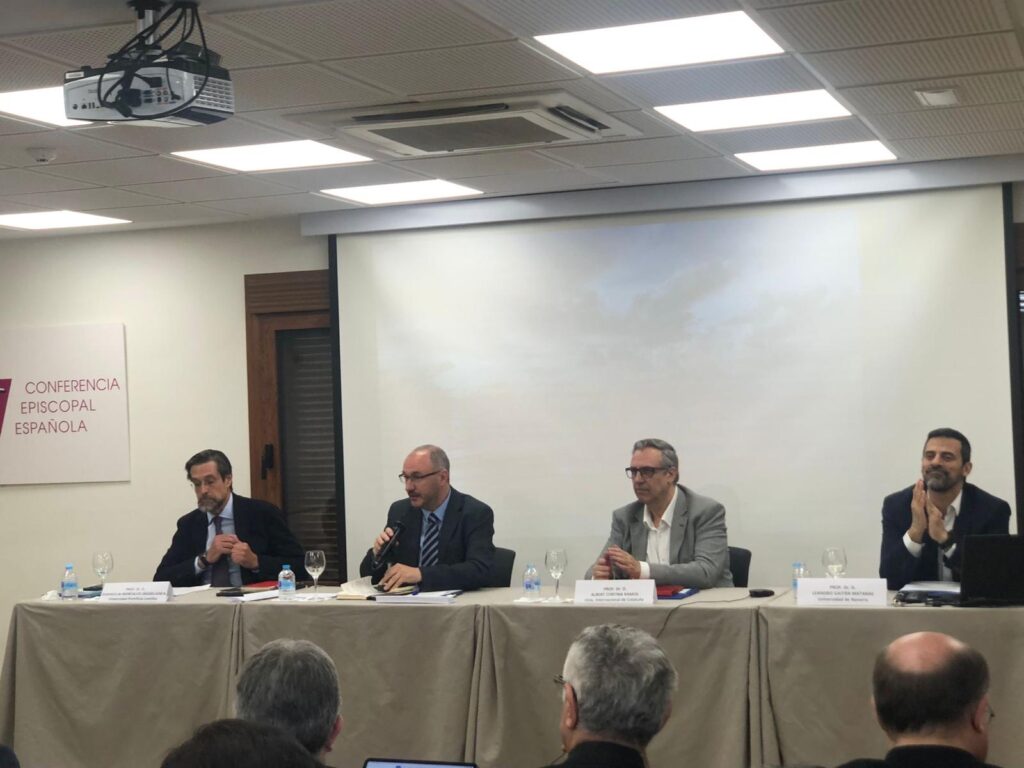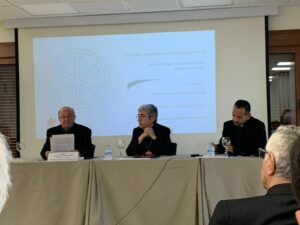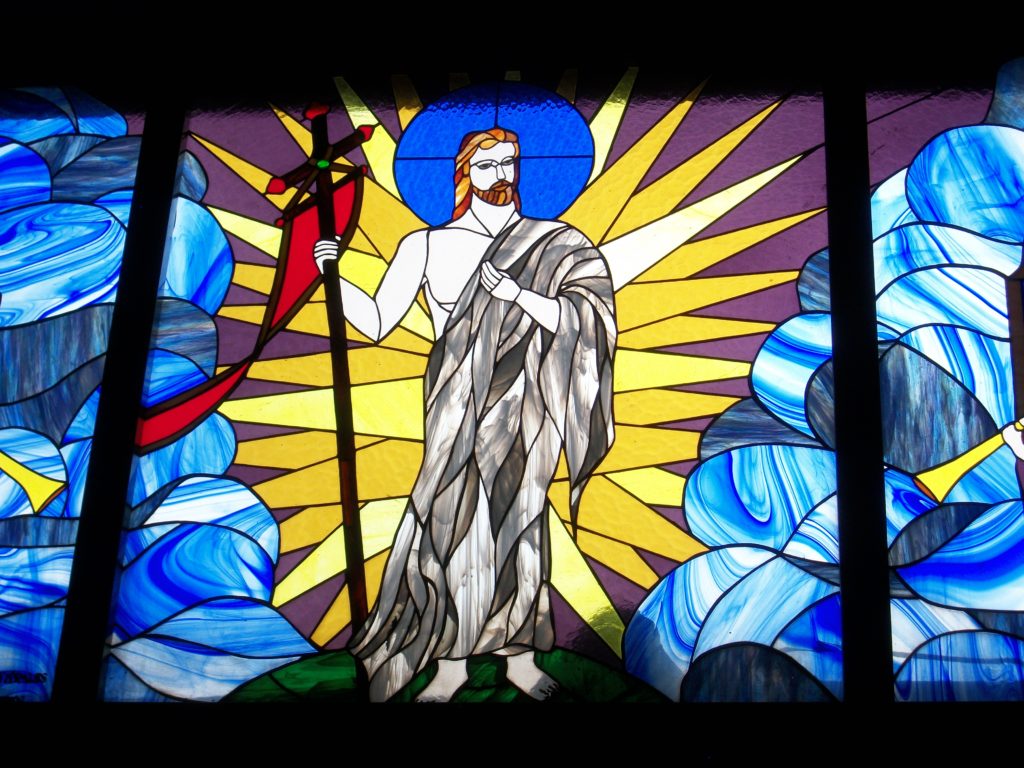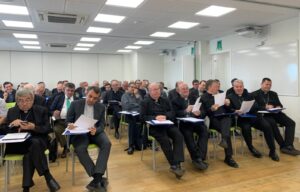A look at Transhumanism from Theology
Political and Social Implications

In the conference given these days by Albert Cortina, professor at the International University of Catalonia, during the meeting between bishops and theologians organized by the Spanish Episcopal Conference and the Episcopal Commission for the doctrine of the faith, Cortina invited the participants to a deep reflection on the impact of transhumanism in our Western societies and explained the relationship that this bioideology has with power, highlighting the need for a balanced and ethical approach in the use of emerging technologies.
Transhumanism, a philosophical and cultural current that proposes the improvement of the human condition through technology, is currently the subject of intense debates from multiple perspectives. The Spanish Episcopal Conference, through its Episcopal Commission for the Doctrine of the Faith, has organized a meeting between bishops and theologians to debate and explore the multiple implications of transhumanism, and especially, analyze the important challenges that this new bioideology poses for the Christian anthropology. The event, held on June 4 and 5, 2024, featured the participation of Albert Cortina, professor at the International University of Catalonia, who proposed several key ideas for debate regarding the political and social implications of transhumanism.
Change of Era
The acceleration of the technocratic paradigm, and specifically transhumanism, aims to fundamentally transform human nature and the networks of life on the planet. This process does not simply represent a change of cycle or an isolated crisis, but an evolutionary disruption that represents a change of era, articulated through different simultaneous revolutions such as the digital and the biological, to reach the so-called technological singularity in the coming years. that is, that moment when artificial intelligence will surpass human intelligence.
Associated concepts:
- Digital and biological revolution
- Technocratic paradigm
- Ecomodernism and integral ecology
- Technological singularity and human improvement
- Artificial superintelligence and artificial consciousness
A reading for the debate was proposed of a text by Max More, a prominent thinker of the transhumanist movement, where he expresses the aspiration to go beyond traditional human limitations to explore a posthuman future.
Institutions
The new global governance is allowing the configuration of cosmopolitan elites that aspire to posthumanity. This phenomenon, described through terms such as globalitarianism and the fourth industrial revolution, poses significant challenges and opportunities.
Associated concepts:
- Globalitarianism and new world governance
- Great reset and global agendas (2030, 2050…)
- Corporate capitalism and cultural neo-Marxism
- Extractive elites and monopolies
A text from the Transhumanist Declaration of the Humanity Plus movement was proposed for debate, underlining the need to take advantage of emerging technologies to overcome human limitations and achieve a still unexplored evolutionary potential.
Sovereignty
The rise of algocracy, a decision-making system based on algorithms, threatens liberal democracies and individual freedom. This system, described as a cyber leviathan, could concentrate power in an unprecedented way, displacing traditional forms of governance and giving rise to a techno-totalitarian global power.
Associated concepts:
- Cyberdemocracy and algocracy
- Cyberspace and metaverses
- National and cultural identities
A text was proposed for debate by José María Lassalle, professor of Philosophy of Law, where we are warned of the possible establishment of an algorithmic governance of the world, which could lead to a global totalitarian phenomenon.
Society
The ideology of transhumanism and posthumanism proposes a new utopia/dystopia for the 21st century, based on the liberation of the biological limits of human nature. This situation could lead to the creation of technological and genetic castes, increasing social inequalities.
Associated concepts:
- Utopia/dystopia and new messianism
- Humans, posthumans, cyborgs and transspecies
- Global ethics and transhuman values
A text was proposed for discussion by Nick Bostrom, philosopher of science, emphasizing the need to ensure that technological progress translates into accessible and secure benefits for all humanity.
 Policy
Policy
Emerging cognitive neocapitalism could generate totalitarian biopower if adequate mechanisms are not established to anticipate and avoid these risks. Hypermodern biopolitics includes the control of the population, individuals and life itself, influencing human nature to substantially alter it and exercise absolute control.
Associated concepts:
- Biopower and biopolitics
- Cognitive neocapitalism and biopolitical totalitarianism
- Fundamental human rights and human dignity
A text was proposed for the debate prepared by the Biopolitics Observatory of the Professionals for the Common Good association, which highlights how the genetic and biomedical information of millions of people can be a source of incalculable political power.
Economy
The automation of work, the rise of intelligent autonomous robots and the deregulation of the platform economy can threaten the welfare state and the economy of the common good. It is crucial to address these challenges with an ethical approach and always taking into account the common good.
Associated concepts:
- Work automation
- Responsibilities of autonomous robots
- Platform economy and data capture
A text by Pope Francis was proposed for debate, which was an excerpt from a speech of his on the “Common Good in the Digital Age”, and where Francis underlines the need for technological progress that respects human dignity and reduces inequalities.
Related

Reflection by Bishop Enrique Díaz: Alleluia, alleluia
Enrique Díaz
20 April, 2025
5 min

Christ is Risen! Alleluia! Commentary by Fr. Jorge Miró
Jorge Miró
20 April, 2025
3 min

Easter: Mystery of Freedom
Carlos J. Gallardo
20 April, 2025
5 min

“Being Catholic in Tanzania is a source of pride”
Fundación CARF
16 April, 2025
6 min
 (EN)
(EN)
 (ES)
(ES)
 (IT)
(IT)


